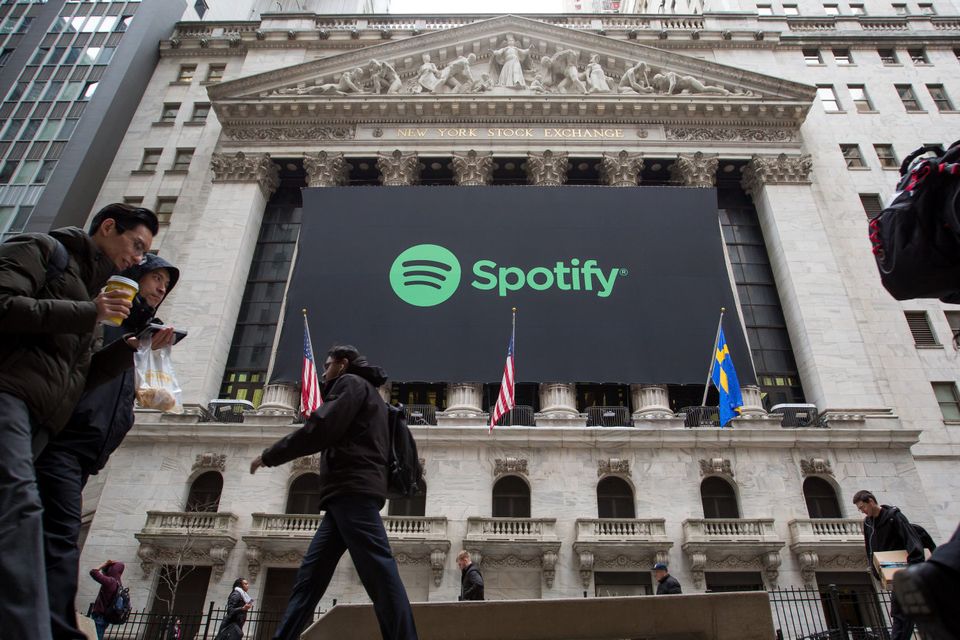Steve Dempsey: 'Streaming and a podcast boom may kill the radio star'
Spotify wants to become the world’s largest audio platform. Photo: Michael Nagle/Bloomberg
The music streaming company Spotify isn't happy with its 200 million users, 96 million of whom are paying subscribers. It wants more. It wants to become the world's largest audio platform and that includes podcasts and on-demand audio.
Last week the Swedish company took a step towards realising its ambition. It agreed a price of around $230m (€202m) for podcast network and production service Gimlet Media. But it didn't stop there. It's also bought Anchor, a startup that helps people record and release their own podcasts. These are complementary acquisitions: Gimlet offers a studio of existing podcasts and podcasting talent, with a proven method of development, production and monetisation. Anchor will lower the barriers to entry for others to get into podcasting, and grow the numbers of people creating podcasts.
The interesting thing is that podcasting wasn't part of Spotify's original plan. But it is big business - and it's growing. Last year the Interactive Advertising Bureau and PwC found podcast advertising revenues in the US totalled $314m (€271m) in 2017. That was year-on-year growth of 86pc. Spotify has clearly been tracking this growth and almost by accident, has found itself as the number 2 global podcasting platform. Apple's iTunes is top, of course. But Spotify is embracing the opportunity to go beyond music. As anyone who's worked in talk radio knows, talk listeners are more loyal and tune in for longer. Spotify CEO Daniel Ek believes that more than 20pc of all Spotify listening will be non-music content. "Our podcast users spend almost twice the time on the platform, and spend even more time listening to music," Ek said. "We have also seen that by having unique programming, people who previously thought Spotify was not right for them will give it a try."
Ek also said something particularly telling: "People still spend over two hours a day listening to radio - we want to bring that radio listening to Spotify, where we can deepen engagement and create value in new ways. With the world trying to reduce screen time, it opens up a massive audio opportunity."
So does that mean that Spotify aims to do to talk radio what Facebook and Google have done to the print media; create a critical mass of digital distribution and disrupt the age-old business model? When it comes to music that's exactly what it's doing. Streaming accounted for 75pc of the $4.6bn revenues from recorded music for the first half of 2018 in the US. But talk radio and podcasts are different in some key regards from music and music radio. In general, there's a premium on being current.
If Spotify is gunning for talk radio the question is, are traditional radio stations proactive about protecting their business? Many are. But how can radio stations to facilitate on-demand listening? How do they get their head around all the new ways that consumers can find their content - from podcasts to skills on Amazon Alexa?
And crucially, how can they measure their audience across these platforms and report this audience back to advertisers? Maybe they need to offer their content without ads to paying consumers? After all, paid audio content is big business in China. Ximalaya is a Chinese audio company that offers paid podcasting on topics like emotional intelligence. It claims to have more than 21 million paying customers, who spent over $64m on podcast lectures and audiobooks in 2018.
A few years back Netflix's stated aim was to become HBO before HBO could become Netflix. Spotify is in a similar position; it wants to steal a march on radio before a disaggregated radio sector can protect itself from disruption. And Spotify isn't the only disruptor. "As much as the next decade will be defined by a more personalised, immersive audio experience, it also will be defined by fierce competition", Daniel Ek wrote. "We know we aren't the only company thinking about or preparing for this future." With potential rivals like Spotify, Apple Music, Amazon, and SiriusXM, traditional radio stations should be thinking carefully about their future.
Join the Irish Independent WhatsApp channel
Stay up to date with all the latest news















